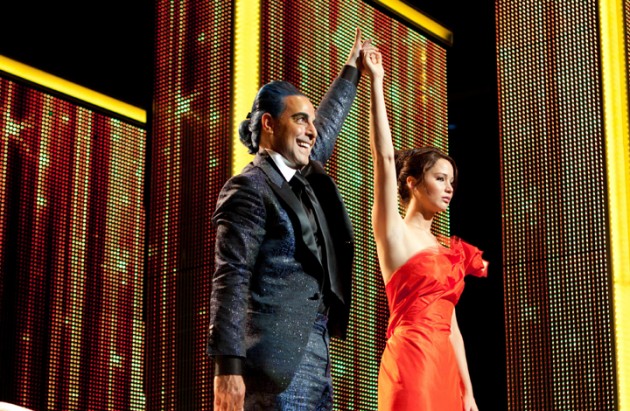
McClatchy Newspapers
By Steven Zeitchik
McClatchy Newspapers
LOS ANGELES — “The Hunger Games,” the teen action-adventure film that opened to big numbers last weekend, is, without question, a parable of the Occupy Wall Street movement. It’s also a cautionary tale about Big Government. And undeniably a Christian allegory about the importance of finding Jesus. Or maybe a call for campaign-finance reform?
Like the Suzanne Collins bestseller on which it is based, the movie about a teenage girl fighting for her life in a televised death match in a dystopian post-apocalyptic country that has replaced America has a whiff of political content. But that has been enough to make a lot of people sniff out their own messages. “The Hunger Games” has become the rare piece of Hollywood entertainment: a canvas onto which disparate and even opposing ideologies are enthusiastically projected.
“It’s the 1 percent (who are killing the kids),” “Gossip Girl” star Penn Badgley told the website Vulture recently, referring to the story’s elites who force young people from different economic backgrounds to hunt one another for the amusement of society’s elites. “I think you’d have to be blind to not see that.”
Pundits at Fox News, however, see a different meaning. “The Hunger Games” is “a furious critique of our political system, in which the central government grows rich from the toil of the masses,” Fox News contributor James Pinkerton wrote on the network’s website, in a piece titled “Hunger Games Shoots Arrows at Big Government, Big Media, Hits Bullseye.” “Ordinary folks are good, government is bad —really bad.”
If Badgley and Pinkerton seem to be watching different movies, there are reasons.
Collins (who also cowrote the film’s screenplay) and director Gary Ross leave a lot of blanks: Viewers don’t know, for instance, how the country sank into the dystopia. And unlike other young-adult literary sensations that have become hit films, such as the “Twilight” and “Harry Potter” series, “The Hunger Games” exists in a world much like ours. There are no fantastical elements — boys can’t fly on brooms or turn into wolves.
That, experts say, allows for commentators to see a more direct relationship with the real world.
“‘The Hunger Games’ has this feeling of being contemporary and political but without being really clear what its politics are,” said Robert Thompson, a professor of media and popular culture at Syracuse University.
Other major Hollywood releases have engendered political debate, of course. In 2009 and early 2010, James Cameron’s “Avatar’ sparked a discourse with its story of a military unit colonizing another planet and attacking a peaceful indigenous people. But perhaps because of Cameron’s personal politics, many commentators saw it as an indictment of the right; indeed, conservatives criticized the film for what they said was Cameron’s sledgehammer message of anti-Americanism.
The interpretations of “The Hunger Games,” in comparison, don’t fall neatly into one ideological or thematic camp.
On the youth-oriented politics site Policy Mic, blogger Danny Keener argued that the story is a morality tale about the dangers of a political system where the wealthy dominate. “Only a handful of Gamemakers exist,” Keener wrote, referring to the exploitative group that stages the brutal Hunger Games, “but they are powerful, controlling just about everything connected to the Hunger Games themselves…. In the current Republican political primaries, there are (also) only a few contributors backing the candidates.”
The New Testament content of the film is also hard to miss — at least according to those who hone in on the triangle (trinity?) of main characters.
“’The Hunger Games’ trilogy is not a mere love story; it is a story about Love,” opined Julie Clawson on the Huffington Post, describing scenes in which characters sacrifice for the sake of others. “Those familiar with the teachings of Jesus would recognize it as the sort of love He requests of his followers.” Clawson is the author of a book titled “The Hunger Games and the Gospel.”
Even Jennifer Lawrence, the star of the film, has gotten in on the act. She told Parade Magazine recently that she saw “The Hunger Games” primarily as an indictment of our obsession with reality television. “I was watching the Kardashian girl getting divorced, and that’s a tragedy for anyone,” she said. “But they’re using it for entertainment, and we’re watching it. The books hold up a terrible kind of mirror: This is what our society could be like if we became desensitized to trauma and to each other’s pain.”
For her part, Collins has said the Iraq war and reality television did partly inspire “The Hunger Games” and its two sequels. But she has been mum as to whether she has any leanings toward, say, the Occupy movement or critics who see government as too big.
Still, as the film plays in theaters, the chorus of discordant voices will likely grow louder. “There’s kind of a coattails thing where people say, ‘I’m going to take my issue and staple it on to “The Hunger Games” and it will carry my issue further than it would make it otherwise,’” said Greg Garrett, an English professor at Baylor University. Fox News’ Pinkerton wrote that, because of its success, “as an indicator of youth sentiment, the movie could prefigure, and accelerate, future political change.”